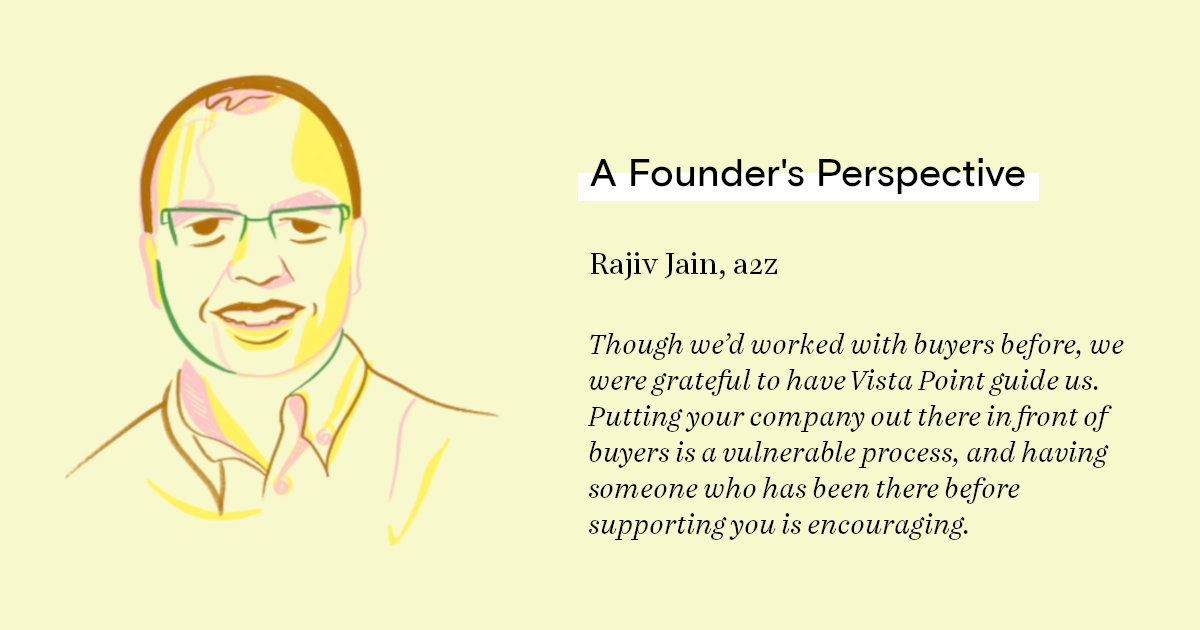If a Founder Has Exit Options, Do They Need to Hire a Bank?
- Why founders consider running a process without a bank
- What founders need to take into account when deciding whether or not to hire a bank
In recent years, the M&A space has become highly competitive as a growing number of investors and strategic buyers vie for a limited number of quality assets.
As a result, acquirers and investors are actively reaching out to founders in an effort to develop relationships early. In a recent survey we conducted of private software & internet companies, 45% of companies with >25 employees stated that 10-25 private equity firms reached out in 2021, with another 30% saying that 26+ firms had reached out.
Considering that founders are receiving so much inbound interest, they may wonder, "Instead of hiring an investment bank, couldn’t I just run a transaction with one of the many acquirers who have reached out to me?"
We receive this question often—and prospective acquirers encourage this line of thinking by suggesting that a process can be "quick and easy" if the founder doesn’t involve an investment bank. To further entice the founder away from hiring a bank, the acquirer may even throw out a high preliminary valuation, saying they just need 60-90 days to close the transaction.
That an acquirer would be so eager to convince you to avoid hiring an investment bank should send up some red flags. And while an influx of inbound interest can create the impression that a founder could take a "for sale by owner" approach, that line of thinking is ultimately to the founder’s detriment as it doesn’t take into account the following:
- A relationship is not a closed deal
- Working with one buyer in exclusivity limits your negotiating power
- Managing relationships with multiple buyers will distract you from the business
- Founders are more likely to realize a good outcome from a diverse buyer list
- Not all transaction terms will be transparent to the founder
1. A relationship is not a closed deal
Even if an acquirer is insistent upon "building the relationship" and even throws out a high valuation before a formal process, nothing is set in stone. If you’re not careful, you could spend months nurturing a relationship with a buyer who suddenly insists on a renegotiation of terms or elects to not close the transaction due to seemingly immaterial findings.
No matter how interested a buyer may seem, remember that it’s their job to sell themselves to you, regardless of whether or not they will be interested further down the road. A lot of work goes into running a deal and many people need to sign off. Just because someone is speaking to you doesn’t mean they’re going to write a check.
2. Working with one buyer in exclusivity limits your negotiating power
A fundamental principle of negotiations is that having alternative options improves your position. Working with one buyer, therefore, weakens your position.
In many cases, an acquirer will prematurely recommend a founder sign an exclusivity agreement. This agreement prohibits the founder from interacting with any other acquirer during a given time frame.
An acquirer’s justification for exclusivity is that they don’t want to spend a lot of money vetting your company only to lose the deal, but a big benefit to them is to lock down your business while they monitor performance over time.
While an acquirer certainly won’t transact without the opportunity to diligence a business, exclusivity is only beneficial to the acquirer, not at all to the founder. If a founder agrees to a lengthy or indeterminate exclusivity period, they take all their other options off the table, drastically diminishing their ability to negotiate. All the while, the buyer who was granted exclusivity gets the benefit of watching company performance over time and slowly wearing down the founder.
3. Managing relationships with multiple buyers will distract you from the business
A founder may try to build relationships with multiple acquirers and run a pseudo-process in an effort to improve their negotiating position. But in this situation a founder will find that entertaining the requests of even just one buyer is a significant burden, let alone handling multiple. As an unfortunate side effect, courting multiple acquirers will keep the founder from focusing on their work, which can materially affect business performance.
In addition, since most founders don’t have a background interacting with the various players, they may find themselves spending a lot of time entertaining acquirers who aren’t in a position to transact or aren’t the right fit—a simple waste of time.


4. Founders are more likely to realize a good outcome from a diverse buyer list
While a founder may have a large volume of interested acquirers reaching out, that group doesn’t necessarily contain a great fit for the founder’s company. The best fit might be an investor or buyer who largely relies on an investment bank to populate their deal flow.
Having a diverse buyer list is important for negotiations, as you can use the strengths of one offer to negotiate out the weaknesses of another. For example, a strategic valuation gives you fodder for negotiation with private equity investors. If you only work with investors/buyers who reach out to you, your buyer list may lack the diversity you need to negotiate the best outcome.
5. Not all transaction terms will be transparent to the founder
Valuation is often viewed as the most important indicator of a founder’s outcome in a transaction. But if a deal is structured to favor the acquirer, then what may appear like a great outcome for the founder in terms of economics and control may actually be a poor outcome when you take a closer look at the terms of the deal.
A few topics that may be unclear to founders but that can significantly affect the post-transaction payout and owner control include:
- Security structure
- Liquidation preferences
- Dividend rights (cumulative vs. non-cumulative)
- Net working capital adjustments
- Participation rights
- Redemption rights and market rates
- Anti-dilution provisions
- And more
Because these various terms are written in legalese, not in the context of the business or the numbers, founders will have a hard time navigating them without an investment bank.
Addressing These Challenges with an Investment Bank
Working with an investment bank counteracts each one of the above challenges, as a structured deal process run through a bank will:
- Draw out the buyers who are serious about closing a deal
- Create competition that encourages buyers to escalate their commitment outside of exclusivity
- Enable a founder to stay focused on running the business
- Include a diverse list of buyers and transaction options to improve a founder’s negotiating position
- Create leverage to negotiate out unfavorable deal terms and increase enterprise value
Finding the Right Exit Option with the Right Bank
Working with an investment bank is essential to finding the right fit and achieving the best outcome. So as a founder, you should be less concerned about choosing the right partner and more about choosing the right bank—one who can design a transaction process with a diverse list of qualified buyers then narrow that list down to the best candidate and best outcome.
Hiring an investment bank will likely be just as unfamiliar to you as selling your business. Learn more about what you should look for when hiring an investment bank.